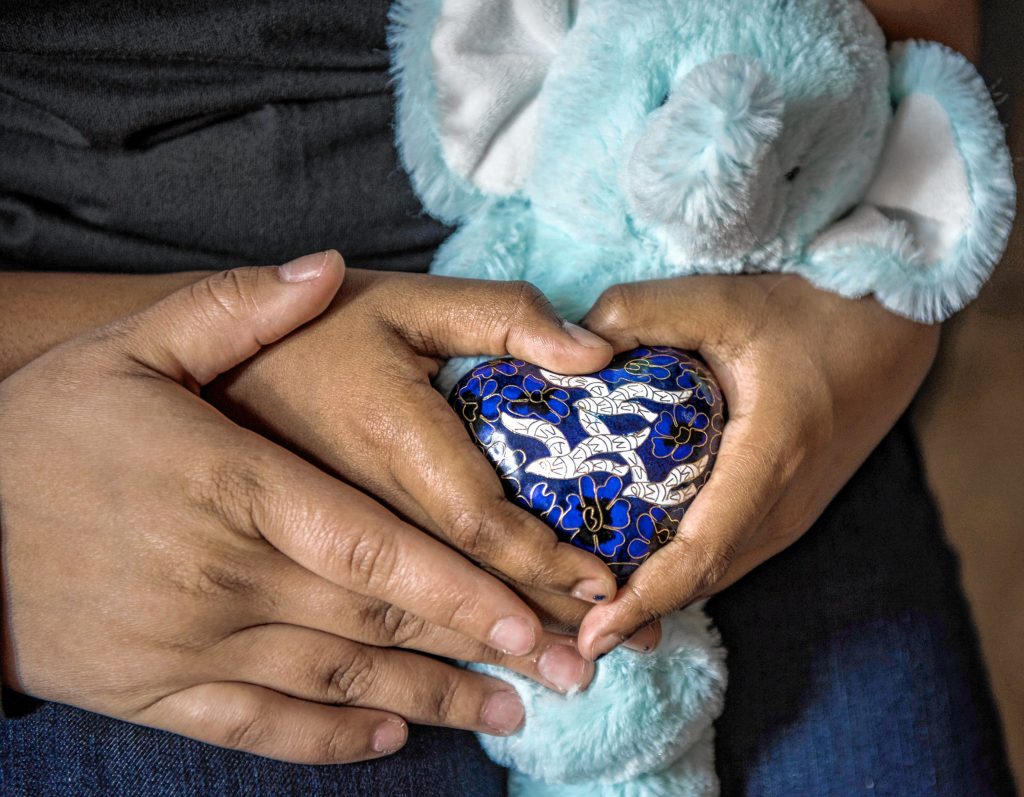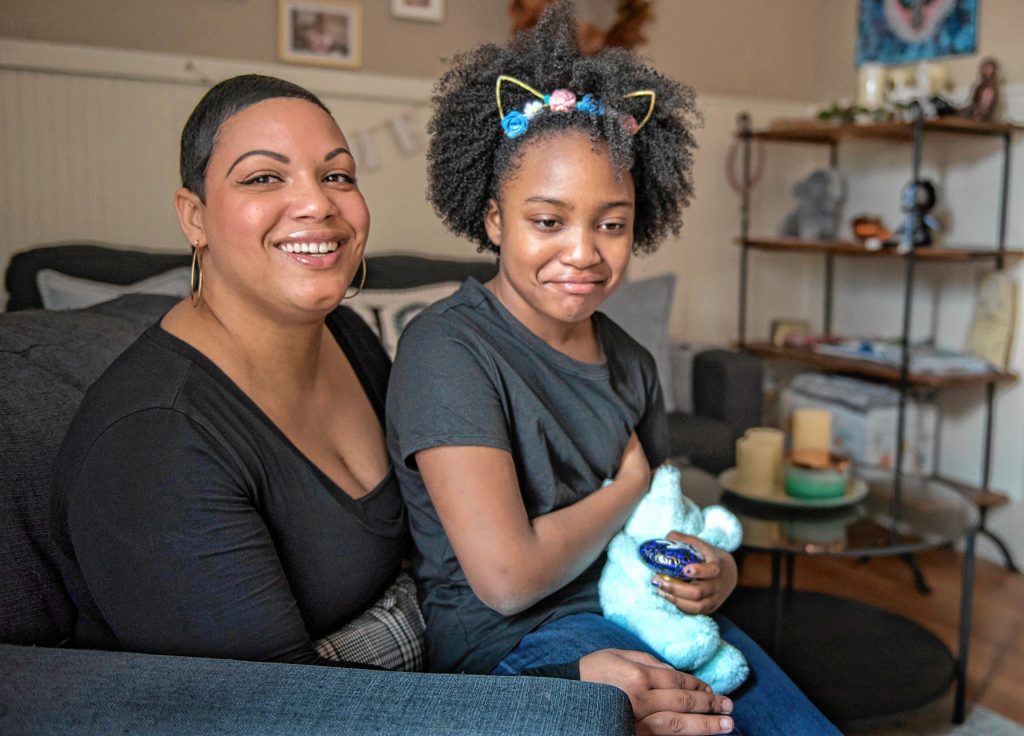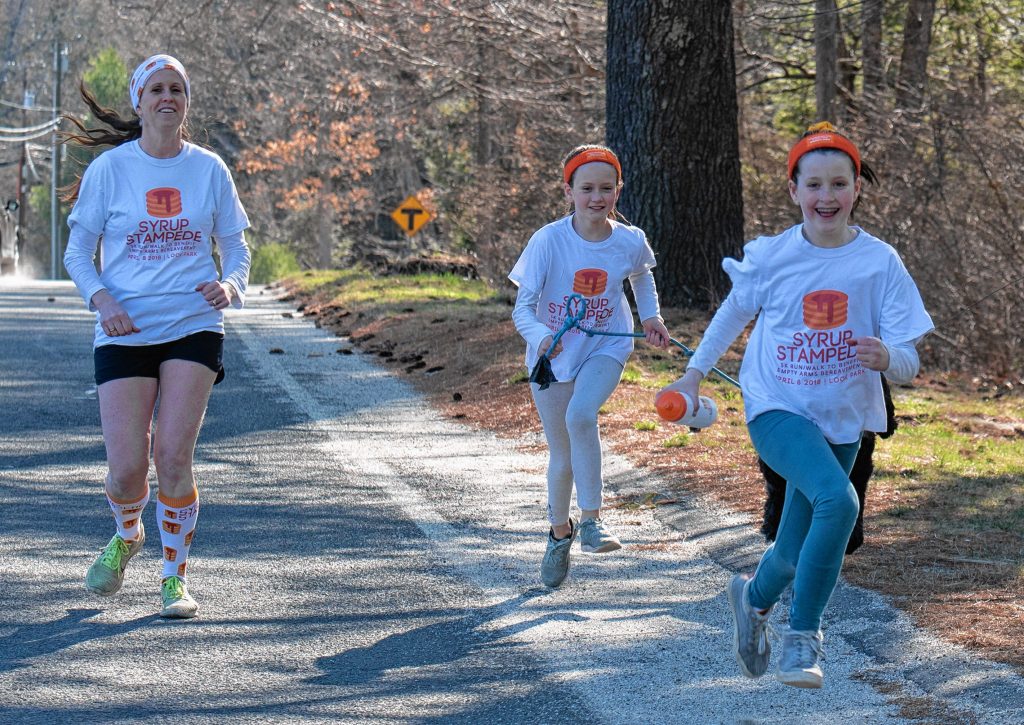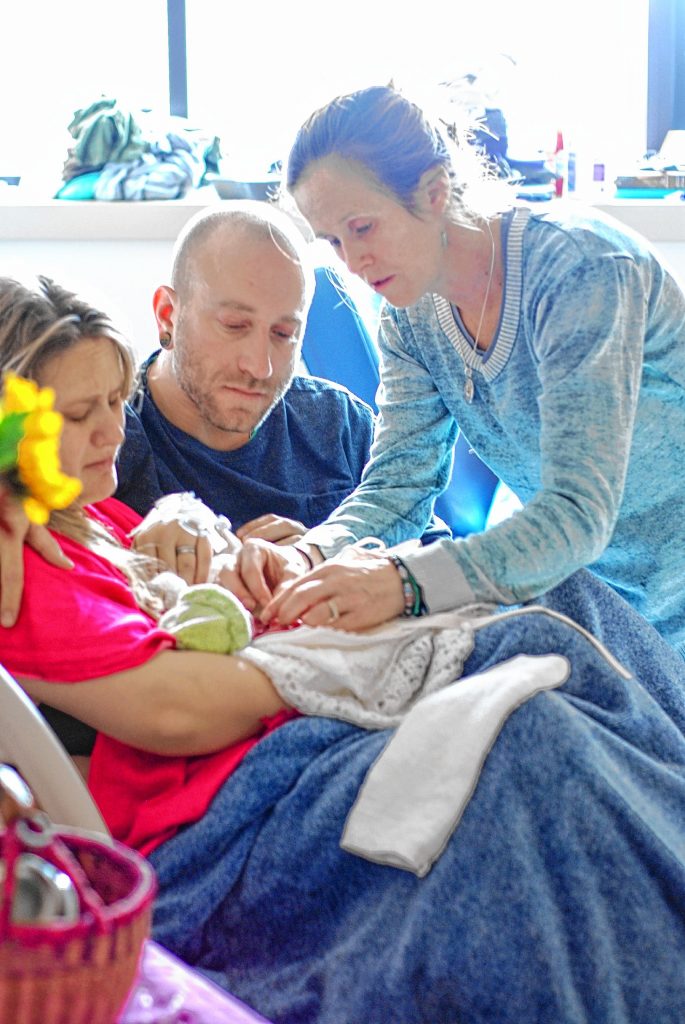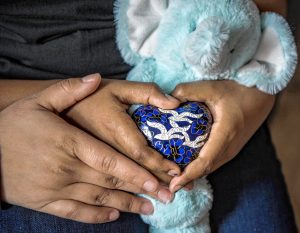It was October 2018 when Emily Collins of Holyoke, now 30, had her second child, Sebastian, who was born 12½ weeks premature. Sebastian lived for 15 days, then died at Baystate Medical Center in Springfield.
Collins’ friends and family, apart from her sister and 7-year-old daughter, were unable to comfort her. Others didn’t seem like they cared, said Collins, who added that she and Sebastian’s father were separated.
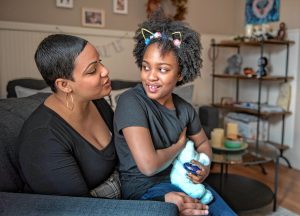
Emily Collins and her daughter, Gabrielle Collins-Hill, 8, pose in their Holyoke home with an urn containing the ashes of her son, Sebastian, who died in 2018 at the age of 2 weeks.
“I felt so incredibly lonely,” Collins said. “It was incredibly isolating, and it felt like there was no one in my personal life who could understand what was going on. Everyone was walking on eggshells, and all my interactions were awkward. I didn’t want to interact with them because I was tired of how weird it was.”
But then Collins got connected with Empty Arms Bereavement Support, a Florence-based nonprofit organization that offers community and connection to individuals who have had children who have died during pregnancy or soon afterward. Collins met with the group’s founder and director Carol McMurrich, who had herself experienced the loss of a child during labor.
McMurrich, now 43, began Empty Arms in 2007 as a group of people meeting once a month. The organization has since expanded to include six monthly groups and about a dozen “companions” who go into the hospital to speak with parents who’ve experienced loss; these companions come from a place of experience, having lost children themselves.
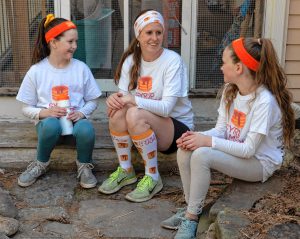
Carol McMurrich with daughters Fiona Reynolds, 10, and Maeve Reynolds, 8, and dog Teddy. Though the Empty Arms fundraiser was rescheduled to Nov. 14, they still run “to keep spirit alive,” said McMurrich.
“We do have support groups, but this organization isn’t a support group,” McMurrich said during an interview at the organization’s space in the basement of the Florence Community Center at 140 Pine St. “It is a community-building organization.”
Like countless other organizations, Empty Arms has been impacted by the COVID-19 pandemic. The group has had to reschedule an annual fundraiser and change the way it reaches parents, with hospital visits no longer an option. But they are finding other ways to connect.
No judgment
When Collins reached out to McMurrich, she found she felt comfortable meeting with her one-on-one, and she was able to talk about her life after her son’s death in a way she couldn’t with others in her social circle.
“She wasn’t going to judge me and say, ‘Oh my goodness, you’re still not getting out of bed, you’re still not taking a shower,’” Collins said. “It seemed like everyone in my life had expectations of me that I couldn’t meet.”
The same day Collins met with McMurrich, she also attended one of the monthly support group meetings.
“The group setting is amazing — you get to be a parent with other parents who have this very unique connection with their children — a group of people who isn’t going to doubt your parenthood because you no longer have a child, because your child passed away,” she said.
Collins found immense value in being able to spend time with her son, Sebastian, after he died.
“Being able to sit with him — I had never seen him without tubes and machines,” she said. “After he died, I was able to see him, his whole face, his whole body. It was really important that I got that time with him.”
Among her greatest regrets is that she did not allow her daughter the same chance to spend time with him, and she believes that if someone from Empty Arms had been with her, she would have made a different decision.
Collins said she doesn’t know if the grief ever truly gets better, but added that she has learned how to function as a person again.
“I still feel sad every day, but I’ve figured out how to find moments in the sadness to rejoice, to think about the time I did get with my son and the ways I’m still able to be his mother,” Collins said.
Collins, who had previously been frightened about speaking in public, now presents on panels trying to eliminate the stigma around infant loss. She also speaks about implicit bias and racism in the medical system.
She said she believes that medical professionals took her less seriously as a woman of color, which played a critical role in her son’s death. She developed severe preeclampsia, a dangerous pregnancy complication for both baby and mother, and had been experiencing symptoms for months, including changes in her vision, headaches and swelling, according to Collins.
“It seemed like the doctors didn’t care until it was too late, and by the time he was born … he was a month behind in size, and there were lots and lots of issues. Frankly, both my son and I were at risk of dying by the time I had an emergency C-section,” Collins said.
If doctors had treated her with the vigilance she believes was needed — additional monitoring, weekly office visits — she thinks her son’s death could have been avoided.
“I think too often with people of color — women of color — that isn’t done,” she said.
A way to network
McMurrich began Empty Arms informed by her own experience. In 2003, when she was 26, her first child, Charlotte, died while McMurrich was in labor. She went on to have four more children.
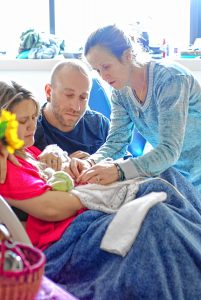
Carol McMurrich, founding director of Empty Arms, supporting Amorn O’Connor and Harrison Blum at Baystate Medical Center after the stillbirth of their daughter Naia in November 2019.
“I was aware that I was probably among the most well-equipped people to have this happen to — a great relationship with my partner, four devoted grandparents, we both had supportive workplaces and amazing friends who supported us — but in the midst of recognizing all those supports in place for me, I felt I could not survive this. I felt so alienated from all those people, so isolated from all those people,” McMurrich said.
It was only after doing research and learning some statistics regarding pregnancy losses and infant deaths that she learned how common they are — in the United States more than one in every 200 babies dies before birth, according to a 2014 study by the Centers for Disease Control and Prevention.
“These people are everywhere,” McMurrich said. “There are people all over western Massachusetts that have this happen.”
She said she felt it was important to be able to ask questions of others who had gone through a similar loss — about how they coped, how they dealt with someone close to them becoming pregnant, how they told their colleagues, or how, if they happened to work with children, they continued to do their jobs effectively.
After the birth of her second child in 2004, McMurrich became a part of a parent support group, which allowed her to network with other parents. Inspired by this experience, McMurrich sought out training to try to network with other parents who had experienced a loss. In June 2007, she held her first meeting of Empty Arms, receiving support from a national organization called Share Pregnancy and Infant Loss Support.
In 2014, the group began doing companion work — meeting with parents in hospitals who’d recently had a loss. They began in Cooley Dickinson Hospital in Northampton, Baystate Franklin Medical Center in Greenfield and Holyoke Medical Center in Holyoke. This past year, the organization began to meet with people at Baystate Medical Center in Springfield.
Unlike in past decades — 1970 and earlier — current medical and psychological thinking recommends that parents and family members who’ve experienced loss should get to spend time with their deceased baby.
“A lot of what we can provide people with is that they need the opportunity to say hello before they can say goodbye,” McMurrich said. “We want people to meet the baby, have some kind of a parenting interaction, and document that time together.”
Adding Baystate in Springfield has significantly increased the amount of companion work the organization can do — Baystate alone oversees more than twice the number of births than in the other three hospitals combined. Since May 2019, the organization has done 38 companion calls at hospitals, and 31 of them were at Baystate.
Companions create footprints and handprints with ink, take photographs and make other mementos people can cherish. In addition to the 12 other companions working currently, there are two Empty Arms staff members, including McMurrich.
“That companion program, going into the hospital to work with people, is a really helpful link for getting people into our community,” McMurrich said. “It is so much easier to come to a group when you already know somebody.”
Most of the groups consist of eight or 10 people at a time, sitting on couches arranged in a circle at the community center. The idea is to make something McMurrich described as “inherently unappealing” — going to a support group — as comfortable as possible.
“I’m going to walk into a room full of people I’ve never met before and lay the most traumatic thing I’ve experienced on the table — I’m probably going to cry, and in front of all these people I don’t know,” she said. “The thing that dragged me through the door was I was so desperate. I didn’t know what else to do.”
Expansion and inclusion
While Empty Arms began with a single support group, it has grown to include groups for those who experience miscarriage and early pregnancy loss, those considering trying for another pregnancy following a loss, and those who terminated for medical reasons.
Marisa Pizii, 43, of Amherst is a co-facilitator of the last group. In 2010 during her second pregnancy, doctors learned that her baby, Josiah, would be born without lungs and would not survive, and she chose to terminate the pregnancy.
At that time, there was no specific group for parents who had terminated their pregnancies, and though Pizii participated in attending support group events, she said she felt her story was different.
Some in the group have a difficult time with the word “abortion” and choose to avoid it, according to Pizii. She tries to work with people where they are, though she is also involved with abortion rights advocacy through her work.
Pizii also volunteers as a companion who goes in to hospital settings to meet with parents who have just lost their baby.
“I let them know that even if they feel isolated and alone that they are not,” Pizii said. “I just let them cry and take up space in whatever way they need to in that moment.”
Harrison Blum, 39, of Northampton experienced the loss of twin girls in November 2018, when both died during a miscarriage within the first 12 weeks of pregnancy. A year later, he and his wife, Amorn O’Connor, had a stillbirth at 23 weeks. He said that while his wife was the one who carried the children and physically experienced the miscarriages, he had grief of his own.
Blum said the group has been supportive of both his and his wife’s trauma.
“In the room, where everyone has this type of loss, there’s a rawness, and it feels validating for someone else to say how crushed they were or how jaded they might be,” Blum said. “It felt great not to have to sugarcoat it for people in the room.”
McMurrich visited Blum and O’Connor at the hospital after the stillbirth of their daughter Naia, bathing the baby and talking with the couple. Blum said she encouraged them to take hundreds of photographs and to hold their daughter. “She is something of an angel,” he said of McMurrich, who guided them through that time.
“She helped us see our daughter with her own eyes, which are much more accustomed to seeing babies at earlier gestation, the development of different parts of her body,” Blum said.
Supporting the work
Empty Arms’ $100,000 budget essentially comes from three sources — grants, individual donations and the annual running event Syrup Stampede — each of which brings in about a third of the organization’s revenue.
The Stampede began in 2018 as a response to the end of the local charity event Valley Gives, upon which Empty Arms heavily relied. The run at Look Park, which also includes a breakfast of pancakes and maple syrup, has been a chance to have a festive celebration surrounding what can be taboo topics of infant death and miscarriage. It has grown from 500 people the first year to 750 the second year. About 1,000 people are expected this year.
Due to the COVID-19 pandemic, the run, which was supposed to take place Sunday, April 5, has been postponed to Nov. 14. Information is available at syrupstampede.com.
“It is fun and a good place for people to show up for a fairly taboo topic,” said Stampede planning committee member Katherine Schmeiser, 36, of Amherst, who joined Empty Arms after the death of her daughter Mabel.
“What people don’t realize is that just showing up is a really big thing. People are worried about saying the right or wrong thing, but you can either show up or not show up. This is an easy thing for people to show up to support people.”
Schmeiser said her daughter’s death at age 7 months had consequences for her relationships with friends and family. Infant and child death is difficult for people to face, and many don’t make the effort.
“They don’t want to talk about it, because it is a reminder to them it can happen,” she said. “You get very isolated.”
Schmeiser said the event is positive and welcoming for people to make it easier for them to show up. In the past, it has drawn a lot of nurses, midwives and other medical professionals, in addition to friends and family members of those who have experienced a loss.
Melissa Mills-Dick, 36, of Granby lost her son Ellis in 2016; he died when she was 7½ months pregnant. She joined the group a few months later and began helping to organize the Syrup Stampede the following year.
“It is like Ellis’ birthday party — I get to invite my family and friends to be able to be there with my kid who I can’t be with,” Mills-Dick said. “Every parent wants their kid to have a good impact in the world. That’s how I make that happen for Ellis.”
Mills-Dick, who is an experienced fundraiser, said the event offers a warm and welcoming environment, and it has been successful. Before the COVID-19 crisis, there were 500 people registered with more than 25 business sponsors. Mills-Dick said she hoped this year’s event would raise $50,000.
Money raised from the Syrup Stampede pays the expenses of the organization, including the salaries of McMurrich and one other staff member, both of whom work half time, and stipends for the companion volunteers that cover gas, child care and other expenses.
Coronavirus challenges
In the past several weeks, the COVID-19 crisis has dramatically altered how the organizations is able to operate. Companions can no longer go into hospitals, and group meetings have taken place via video conference.
McMurrich worries in particular about people who have a loss during the crisis. The organization has a much lower response rate from people who do not receive an in-person visit, she said.
To counteract this possibility, McMurrich has assembled packages for parents who experience a loss that include testimonial letters from people who have found the program helpful, along with kits filled with art supplies that will help parents make their own mementos. Contact information for the organization is also included.
But McMurrich noted that a big part of the companion program involves providing another witness to the baby’s existence — and that part is not possible to offer right now.
“It seems like a minimal thing — this baby died, does it matter how many people walk in and out of the room? — but most people have a concrete sense of how many people saw that baby and remember that baby as a real person who existed,” McMurrich said.
During the first teleconferenced support meeting since the pandemic started, McMurrich said there were more people than usual who showed up.
“More than ever, people are really isolated, and isolation is triggering for people who are grieving,” McMurrich said. “I have been putting more meetings on the calendar. I just think this is a time where we need to be putting more supports into place.”
While the circumstances are difficult for the organization, and for grieving parents, McMurrich is vowing to press on. She hopes that, when all is done, the organization will be able to offer everything it has in the past, as well as offer monthly video conference meetings.
“We’re going to coast in this place until we can rise up out of it,” she said.
Learn more about Empty Arms at emptyarmsbereavement.org or by calling 413-570-0811. Dave Eisenstadter can be reached at dave.eisen@gmail.com.

